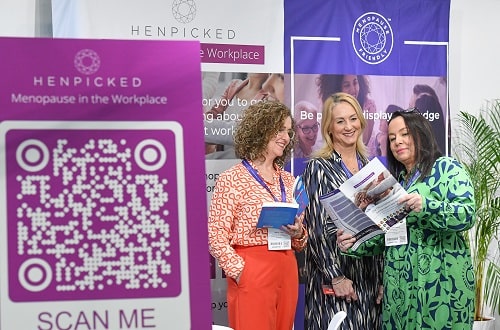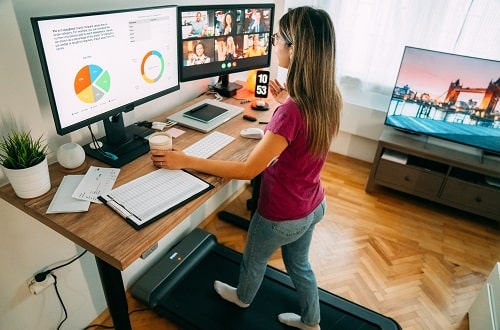Many people feel the recent shift to home working has boosted their productivity and work-life balance, so it’s crucial employers consider the views of staff when deciding whether to offer remote working as a long-term option, says Phil Pinnington.
Features
Home alone
Much has been written and discussed about our working lives post-pandemic. We are shortly to reach a significant milestone, the first anniversary of full-blown home working. Some employers foresaw the likelihood of lockdown and started to plan. Most, however, were forced to switch their businesses to remote working with little or no preparation.
It’s fair to say that despite the relaxing of lockdown during the summer months, many employers opted to maintain the home working model for many employees. The third national lockdown we have been under should, one could argue, look like business as usual.
 Everyone is fragile now for many reasons, and simply asking staff for feedback is not going to be enough. Photograph: iStock
Everyone is fragile now for many reasons, and simply asking staff for feedback is not going to be enough. Photograph: iStock
There is, however, a fundamental problem with simply accepting that home working will become the norm. We know many people were ill-prepared for home working with some working from laptops in bedrooms and kitchen tables. No one really believed in April 2020 that they would still be working from home in January 2021 – it would probably have been a ludicrous suggestion yet here we are.
During these short, early days of the year, I find it interesting when I do my daily walk to see lights on and people working away on their adapted workstations. Some still work from the dining table; others have converted rooms and have a full-blown home office set up. I often think, do the dining room table workers hold higher hopes of returning to the normal office than those with fully kitted-out home workstations?
The Management of Health and Safety Regulations 1999 make very clear that employers have an obligation to provide a safe working environment in which to work. I’m sure those who drafted the rules were not considering that home and remote working would play a significant part of modern life, yet employers are still expected to do everything reasonably practicable to support those employees – whether they’re mobile engineers, salespeople visiting clients or employees working from home.
 Employers need to foster trust in a time where trust has never been more important. Photograph: iStock
Employers need to foster trust in a time where trust has never been more important. Photograph: iStock
The Health and Safety Executive (HSE), quite wisely, deemed working from home during the pandemic as a temporary adjustment. At some point, if it hasn’t already happened, senior leaders will be deciding how the workplace looks post-pandemic and this review must consider the positives and negatives of a remote workforce.
I have been encouraged to see many employers take a supportive stance in relation to employees who are forced to home-school their children during lockdown. This, I believe, signals that wellbeing is being recognised as critical to maintaining a healthy workforce, but this is only one area.
There has been a huge physical cost from this pandemic with the number of people dying now over 100,000. We will continue to see limitations and restrictions in some form for some time to come and this will exact a cost on everyone’s mental health.
It’s interesting to hear more and more employers talking about performance based on outcomes. Presenteeism has been recognised for many years now as a major concern during times of economic difficulty yet sadly we still see some employers who encourage employees to just ‘knuckle down and you’ll come out the other side’. I believe this approach is both unproductive and will lead to a serious mental health emergency.
So, with all these factors to consider, how should employers approach the question of whether working from home is good for their employees and in turn their business? We already know consultation works, but we need to remember everyone is fragile now for many reasons, and simply asking staff for feedback is not going to be enough – especially when that feedback isn’t going to be delivered face-to-face.
Employers need to continue to work with their employees, fostering trust in a time where trust has never been more important. Adaptions will have to be made, some employees will be keen to return to their old workplace, some are enjoying the new-found flexibility home working has given them and lots will be in the middle of these two extremes.
I don’t for one moment suggest that everyone will get what they want and hard business decisions will need to be made, but I believe if you keep open dialogue with your employees whilst managing expectations, you will be able to make balanced judgments that help your business and your employees. After all, a happy worker is a productive worker.
See here for HSE's home working guidance
Homeworking questionnaire from CIPD here
Phil Pinnington is audit and consultancy manager at the British Safety Council.
FEATURES

Why line managers play a vital role in workplace wellbeing
By Marcus Herbert, British Safety Council on 03 September 2023
The behaviours of line managers can have a positive or negative impact on employee health, wellbeing and engagement, so it’s vital managers get staff feedback on whether their management style is supportive or negative, and have regular check-ins so workers can raise concerns about their wellbeing.

Watercooler Event to hone in on eight trends in employee health and wellbeing
By Claire Farrow, Make a Difference Events & Media on 15 April 2024
The free-to-attend Water Cooler Event at ExCeL London on 23–24 April will see more than 6,000 workplace experts coming together to explore the latest thinking, solutions and best practice for supporting and boosting employee wellbeing, diversity and workplace culture.

Sedentary working and how to combat the ‘sitting disease’
By Gavin Bradley, Active Working on 05 April 2024
Prolonged and excessive sitting poses a major risk to our health, but the Get Britain Standing campaign and On Your Feet Britain Day on 25 April are a great way of encouraging workers to sit less and move more.



